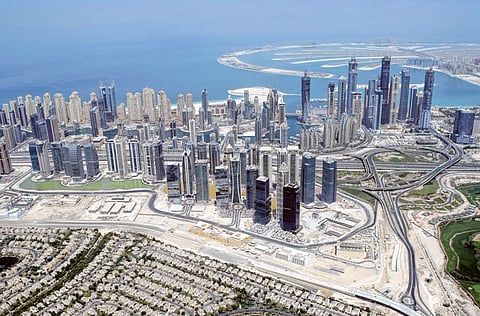Abu Dhabi, Dubai most expensive cities in Gulf
But UAE Government's efforts to control food inflation have reduced living costs

Dubai: Although the cost of living in the UAE has fallen over the past year, Abu Dhabi and Dubai are still two of the most expensive cities in the Middle East for expatriates, according to a new report from the global consultancy firm, Mercer.
Abu Dhabi, which ranked 67th overall in Mercer's 2011 Cost of Living survey, has dropped 17 places from last year. Dubai also fell to 81st, down 26 places, in the latest report released yesterday.
The survey covers 214 cities and compares costs of items such as food, housing, transport and clothing.
The Israeli city of Tel Aviv is the most expensive city in the Middle East for expats, ranking 24th in the global standings, followed by Abu Dhabi and Dubai respectively.
"Dubai in particular has witnessed a reduction in accommodation costs since 2009 as the strong supply of property coming on to the rental market has reduced the shortage that existed in the several years prior to 2008," said Callum Burns-Green, head of Mercer's Dubai office.
Burns-Green says government initiatives to control food inflation, such as the stabilisation of essential commodities, have helped UAE cities move down the table. "Where the depreciation has been accompanied by political stability and good levels of security, such as in the UAE, we would generally expect a favourable impact on those cities from an economic perspective as expatriates and their employers see a reduced cost of living there," he added
New York was used as the base city in the Mercer report with all cities compared against the financial capital of the United States and currency movements were measured against the US dollar.
Biggest expense
The cost of housing — often the biggest expense for expats — played an important role in determining where cities were ranked.
"Not only is the UAE becoming more affordable for expatriates, but generally speaking the UAE has regained a lot of its competitive advantage on the global scene in comparison with other international hubs. This is particularly true of Dubai, which really is the business hub for the region," said Philippe Dauba-Pantanacce, senior economist for global markets, Middle East and North Africa at Standard Chartered Bank.
Dauba-Pantanacce says as long as rental inflation pressures remain muted, both Abu Dhabi and Dubai will maintain a comparatively cheaper cost of living while gaining a competitive edge over other global centres.
"The biggest component of the CPI [consumer price index] basket in the UAE is the rent item. Rentals have fallen between 40 to 60 per cent from peak to trough, which has had a major impact on the general cost of living since it represents — as exemplified by the CPI weight components — the biggest expense of a typical household," he added.
Elsewhere in the GCC, Riyadh was ranked 135th followed by Manama (157), Kuwait City (159), Doha (164), Muscat (184) and Jeddah (185) with the trend of falling accommodation costs prevalent across the entire Middle East region.
"There is a real imbalance between supply and demand across the UAE and the global economic situation is driving rents down in both Dubai and Abu Dhabi," said Matthew Green, head of research and consultancy for the UAE at CB Richard Ellis Middle East.
Top ten
- Luanda (Angola)
- Tokyo (Japan)
- Ndjamena (Chad)
- Moscow (Russia)
- Geneva (Switzerland)
- Osaka (Japan)
- Zurich (Switzerland)
- Singapore
- Hong Kong (China)
- Sao Paolo (Brazil)
— Source: Mercer



